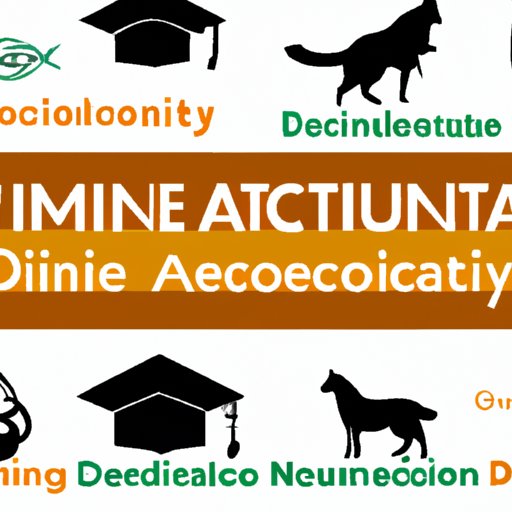
Overview of an Animal Science Degree
A degree in animal science is an interdisciplinary field that combines elements of biology, chemistry, nutrition, genetics, physiology, microbiology, and other sciences to explore the biology, health, and management of animals. This type of degree provides students with a comprehensive understanding of animal behavior, nutrition, reproduction, and general health. It also covers topics such as animal welfare and sustainable production systems.
Definition of Animal Science
According to the American Society of Animal Science, “Animal science is the application of scientific principles to the care and management of domesticated animals. It involves the study of the biology, anatomy, physiology, nutrition, behavior, and genetics of animals.” The purpose of animal science is to improve animal husbandry practices and provide better living conditions for animals.
Sub-disciplines of Animal Science
Animal science encompasses a variety of sub-disciplines, including animal nutrition, animal genetics, animal reproduction, animal behavior, dairy science, poultry science, meat science, and more. Each sub-discipline focuses on a different aspect of animal science and requires specialized knowledge and skills.

Benefits of Pursuing an Animal Science Degree
Pursuing a degree in animal science can open up a wide range of career opportunities, allowing graduates to work in a variety of settings in both the public and private sectors. A degree in animal science also offers students the opportunity to gain hands-on experience with animals, learn about animal welfare and nutrition, and develop personal growth and development skills.
Broad Scope of Career Opportunities
A degree in animal science can lead to a variety of career paths, from research and development to veterinary medicine and agriculture. According to a survey by the National Association of Colleges and Employers, animal science majors reported an average starting salary of $43,000 and a mid-career salary of $72,000. Graduates of animal science programs can go on to pursue careers in animal agriculture, veterinary medicine, research, education, and more.
Hands-on Learning Experience
In addition to the academic coursework, many animal science degree programs offer students the opportunity to gain hands-on experience through internships and field work. These experiences allow students to apply their knowledge and skills in real-world settings and gain valuable insight into the industry. Furthermore, these experiences can help students develop important professional relationships and build their networks.
Personal Growth and Development
Pursuing an animal science degree can be a great way to grow personally and professionally. Students can gain knowledge and skills in a variety of areas, such as communication, problem solving, critical thinking, and decision making. They can also learn how to work with others effectively and develop leadership qualities. Furthermore, studying animal science can help students gain a greater appreciation for animals and the environment.
Types of Courses Included in an Animal Science Degree Program
The types of courses offered in an animal science degree program vary depending on the school and the program’s focus. Generally, most programs include core courses, elective courses, and specialty courses. Core courses typically cover topics such as animal nutrition, animal genetics, animal physiology, and animal behavior. Elective courses may include topics such as livestock management, equine science, or agribusiness. Specialty courses may cover topics such as animal ethics, food safety, or biotechnology.

Careers Available to Animal Science Degree Holders
Graduates of animal science programs can pursue a variety of careers, including those in veterinary medicine, agriculture, research, and education. Veterinary medicine is one of the most popular career paths for animal science degree holders. Veterinarians are responsible for diagnosing and treating diseases and injuries in animals, performing surgery, and providing advice on animal health and welfare. Other potential career paths include agricultural production, laboratory research, and teaching.
Tips for Succeeding in an Animal Science Degree Program
To succeed in an animal science degree program, it is important to develop good time management skills and take advantage of networking and internship opportunities. Additionally, students should participate in student organizations to broaden their knowledge and gain valuable experience. Finally, they should stay organized and keep track of all assignments and deadlines.
Financial Aid and Scholarships for Animal Science Degree Programs
Many schools offer financial aid and scholarships to help students pay for their animal science degree programs. Grants and scholarships are typically need-based, while loans and work study programs are available to students who demonstrate financial need. Additionally, some schools offer special grants and scholarships specifically for animal science students. Students should check with their school to find out what financial aid options are available.

Important Trends in Animal Science and How They Impact Degree Programs
Animal science is an ever-evolving field, and there are several important trends that are impacting degree programs. Technological advances, such as genetic engineering and artificial intelligence, are revolutionizing the industry by providing new ways of improving animal health and productivity. Globalization is also having an impact, as the demand for animal products increases worldwide. Finally, sustainable practices, such as humane animal husbandry and responsible resource management, are becoming increasingly important.
An animal science degree is a great option for those interested in a career working with animals. It provides students with a broad understanding of animal biology, behavior, nutrition, and management, as well as hands-on experience and personal growth opportunities. With a degree in animal science, graduates can pursue a variety of career paths and make an impact in the industry.
(Note: Is this article not meeting your expectations? Do you have knowledge or insights to share? Unlock new opportunities and expand your reach by joining our authors team. Click Registration to join us and share your expertise with our readers.)
